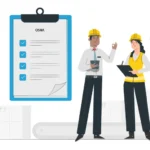5 min readEfficient construction inspections stand at the core of successful construction businesses. These inspections encompass meticulous evaluation, rigorous testing, precise measurements, and meticulous material comparisons. In the past, these processes were laboriously manual, but the tide has turned with the rapid advance of technology. Today, businesses are bidding farewell to traditional paper forms and embracing the future with digital mobile forms, construction daily report apps, and cutting-edge construction inspection software.The construction industry can be quite demanding when it comes to meeting deadlines. Supervisors often face immense pressure to ensure that projects are completed on time and within budget. It can be a challenging environment, but with the right approach and a dedicated team, success is always possible. Amidst this, the adoption of mobile forms emerges as a game-changer. This article delves into the strategic implementation of mobile apps, offering insights into how they can revolutionize construction field reporting while maintaining stringent compliance protocols.
Streamlined Inspections, Minimized Paperwork
Precision in Compliance Reporting
-
Improved Quality and Minimized Rework
Speed-up inspections:
Enhanced compliance
Tracking the progress of construction projects
Managing inventory and materials
Generating reports on safety, quality, and other metrics


